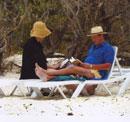Changes that Bring about Change
Marco Polo, the best-known voyager of all time, described for Europeans the geography, traditions and existence of many regions he toured from Venice to the faraway nooks and crannies of Asia. The extraordinary effect of his journeys egged on other sailors to take to the seven seas, helped the development of cartography, trade and diplomacy, paved the way for millions of readers from around the globe and built a fire under the crew that brought Christopher Columbus not to the Indies, but to the Caribbean and the rest of the Americas. What scholars never mention about Marco Polo is that he brought about change by traveling. He grew up as a man, proved himself, learned other languages and customs, put his wisdom and skills to the test, enhanced his own horizons and took a firsthand look at other religious creeds. In a word, he loved, grew up, longed for his culture and knew what the pleasure of coming back is all about.
The point is that travels bring about changes. Changes for the better, no matter what the motivations, the duration, the rhythm, the means of transportation, the time of year, the crew or the dark desires of travelers might be. A journey is a change that changes. The heart of the matter is to embark on the kind of trip that you need and ward off the wrong voyage. Yet you don't have to be frightened by the weight or significance of the word change. Sometimes you just want to change the surrounding scenery, the tan of your skin, the entire look, the scope of mundane knowledge, the food you eat, come up with new anecdotes, souvenirs, keepsakes or new words, or perhaps it's all about getting off the treadmill and leaving behind the backlog of pending tasks. That definitely feels good.
Some other times, either on similar or different journeys, purposely or unexpectedly, the trip goes beyond all that and winds up livening up the spirit, the creation of new motivations, the knowledge of other peoples, the change of certain values, the rupture of biased behaviors, the reaffirmation of identities, the forgetfulness of sorrows or the encounter of love… all at once.
Regardless of how contemporary the concept of tourism might sound, and despite the modern triviality that sometimes perks it up, traveling is as old as mankind and serious enough to make a profound splash in our own lives. From the dawn of man to date, sacred and historic books, the fine arts, the performing arts and literature have portrayed traveling as a natural activity of all human beings, just like work and language.
Maybe this simple truth trapped in a nutshell gave rise to travel and pried it open as a universal token of life and spirituality. Not even the simplest voyage can be boiled down to a mere physical and geographical tour through space and time. All roads pose challenges of their own and all trips –no matter how pleasant they might be- are challenges: an encounter of your own with obliviousness, of the same with the different, of the intimate with the public, of the past with the present. That's the driving force and the psychological value of traveling.
There are countless situations, problems, ailments and moral difficulties in which popular wisdom has always suggested people to travel. Youngsters eager to underscore their independence and ideals, sometimes rush past the threshold of adultness by embarking on a trip. Many centuries before Christ, Siddhartha Gautama (Buda) left his family behind and all the wealth he had to set out in search of truth. Many centuries later, as depicted by Walter Selles in his great movie Diaries of Motorcycle, a couple of middle-class young men hit the road not only to unearth the dark side of a world that was both close at hand and too far to reach out to, but find themselves caught up in a web of laughter, love affairs, adventures, pains, sorrows, hurdles and emotions that were good enough to make them change their lives and inquire about the world.
But ordinary young men, who are not philosophers, preachers or heroes, can find in traveling a multitude of psychological benefits. And as a matter of fact, that's also a possibility of change for possessive, authoritarian, demanding and overprotective parents who are put through their paces when their children decide to sally forth on their own, only with their travel mates and knapsacks in tow.
Travel spurs creativeness and imagination out of the clash between personal patterns and new traditions and scenes. They stimulate in-depth study of things you watch on the road and buttress the ability to observe things carefully. It doesn't matter whether it's an epic, historic, adventurous, revealing, scientific or leisure journey. Odysseus, Herodotus, Cervantes, Darwin and Humboldt, alongside many other travelers, have enjoyed for centuries the pleasure of becoming far better observers.
Without their own voyages, Cervantes would have never written Don Quixote and Herodotus could have never chanted about the ancient world, nor Darwin would have come up with his natural selection theory. Once again, I resort to extreme examples to make my point, but we're not so much different from Darwin when we stop to see how fish are caught and fried in far-off seaports, when we watch how the color of the sea changes when we fly over the Caribbean or how the Mayans used to build. Traveling shifts our intellectual processes into higher gear.
But traveling is good for lots of other things, too. You can set out on a trip to pay a promise, to have mystical experiences, to relive historic occurrences, to stay away from someone or to meet that same person, to walk away from strain or to get trapped in a bustling ambience, to take chances or find shelter, to fight off depression and win back an illusion.
Last but not least, you travel for love. People are recommended to take trips in order to put an old love in the back on their minds or to find love, even to rekindle the flame of a love affair that's just about to go out. The start of a new stage of life begins with a honeymoon trip. There are no limits as to time and age: in any time of year and at any age, traveling makes life more fun and changes everything.
Thus, in Garcia Marquez's Love in Times of Cholera, after Florentino Ariza reiterated his invitation to Ferminia Daza, a widow, to take on a relaxing trip together down the Magdalena River, she finally accepted. Once in the cabin of the New Fidelity vessel, she realized Florentino Ariza was the man she had always had within her reach. The morning after, when she saw him speaking with the skipper, she noticed a different man before her eyes, “not only because she used to look at him differently at the time, but also because he had indeed changed.”
She was also changing with each passing day. “My God, how crazy I am when I'm on a ship!,” she said. When Ferminia eventually got off the boat, she realized that “roses were smelling better than before, and birds were chirping at daybreak louder than before.” From that moment on, Florentino Ariza and Ferminia Daza started hearing the mermaid singing of manatees, began caring for the conservation of species and never stopped remembering stories from the past. Together forever, and with the same determination that a 17-year-old young man named Marco Polo set sail to China, the pair of seniors ventured into the future. Love and traveling had definitely changed them for good.




































































